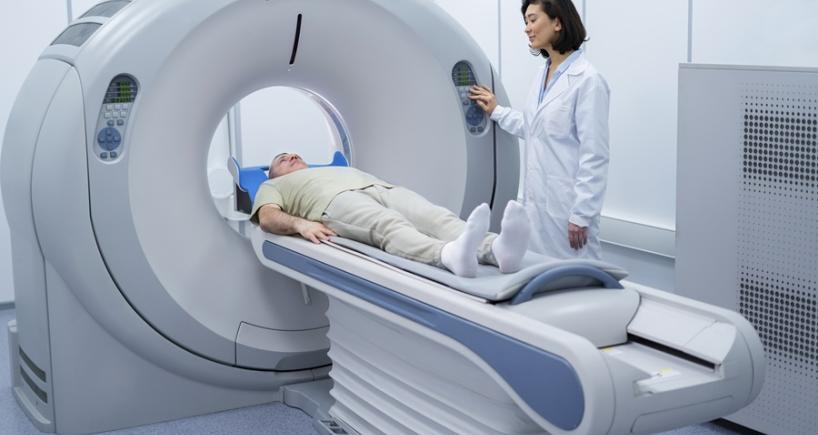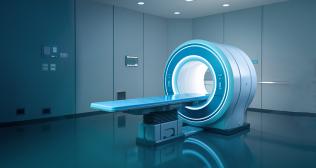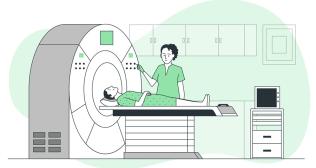
Navigating Radiation Therapy: Minimizing Side Effects and Enhancing Recovery
In the war against cancer, radiation therapy serves as a powerful weapon that acts as a beacon of hope. Radiation therapy (also alternatively referred to as radiotherapy) is a form of cancer treatment that utilises high doses of radiation to knock down cancer cells as well as shrink tumours. At low doses, radiation is utilized in X-rays to glance inside a Patient's body, as with X-rays of a person's teeth or broken bones.
How radiation therapy works against cancer?
At high doses, radiation therapy knocks down cancer cells/slows their growth by damaging their genetic material - DNA. Cancer cells whose genetic material DNA is damaged beyond repair stop multiplying or die. When the damaged cells are killed, they are broken down and eliminated by the body.
Radiation therapy does not destroy cancer cells right away. It takes days or weeks of treatment prior to DNA being damaged sufficiently for cancer cells to die. Then, cancer cells keep dying for weeks/months post radiation therapy finishes.
Side Effects of Radiation Therapy
Like different types of cancer treatment, radiation therapy can cause side effects as well as have a profound effect on patients' quality of life.
Side effects may comprise:
- Tiredness.
- Nausea.
- Vomiting.
- Loose, watery motions
- Pain in the head
- Irritation of skin
- Dry, itchy scalp.
- Hair loss.
- Mouth ulcers.
- Pain when a person swallows.
- Decreased appetite.
- A burning feeling in a person's throat or chest.
- Pain or a burning sensation when a person pees.
- The requirement to pee frequently (often in small amounts).
- Abdominal bloating or cramps.
- Sense of urgency to have a bowel movement.
Minimizing Side Effects and Boosting Recovery
The good news is that there are few things patient can do to ease the side effects of radiation therapy and maintain their health and sanity. Here's what is recommended:
Get sufficient sleep during radiation therapy.
A lot of patients face difficulty sleeping post getting a cancer diagnosis, while others start to experience fatigue near the completion of radiation therapy. Exhaustion as well as lack of sleep can impact mood and make it harder to tackle the stress of cancer treatment.
But simple strategies, like practicing a nighttime ritual, writing down patient's worries, and avoiding naps, can help patient cope with insomnia during treatment. It's also crucial that patient talks to their doctor about tiredness and insomnia since these issues often go undiagnosed and get more tips to cope with insomnia.
Treat the skin exposed to radiation with TLC.
The skin in the area where the Patient is receiving radiation therapy may become red and sensitive, similar to a sunburn. Their radiation oncology nurse will review specific instructions for caring for the Patient's skin, so it's important to note them. A few of the things the Patient's nurse will tell them comprise:
- Don't wash off marks from the radiation simulation. These help healthcare providers ensure the radiation's direction is in the right place during the Patient's treatment.
- Clean the skin gently with lukewarm water along with a mild soap.
- Avoid utilising powders, perfumes, lotions, aluminium deodorants, and products consisting of alcohol in the treatment portion unless approved by patient's oncology nurse.
- Avoid putting anything hot (heating pads)/cold (ice packs) directly on the treated skin.
- If patient spends time outdoors, wear a hat or clothing to shield their skin. Post treatment, utilise sunscreen with SPF 30 or higher.
Maintain a well-balanced diet.
A lot of cancer patients face malnutrition because they struggle with nausea or can't get adequate nutrients during treatment.
While certain types of radiation therapy may need a change in person's diet to minimize side effects like malnutrition as well as nausea, it's essential to maintain your weight. Remembering that radiation therapy is not the time to start a weight loss program is also necessary.
Commit to physical activity.
For patients who are ready for it and are already physically active, exercising during the radiation therapy procedure can aid with tiredness, mood problems, as well as stress management. Even going for a stroll for a few minutes can help.
Get the support needed.
During a person's cancer diagnosis and treatment, they're likely to experience an array of emotions, comprising anxiety, depression, fear, or hopelessness. Support may help people talk about their feelings with a close buddy, family member, chaplain, or another spiritual leader, nurse, social work counsellor, or psychologist.
In a nutshell, the Patient must keep in mind that every person's response to radiation therapy differs. These tips act as general guidance, as well as personalized suggestions from the Patient's healthcare team are crucial. Taking a proactive approach to self-care can improve the Patient's total well-being during and post radiation therapy.
Popular Searches :
Hospitals: Cancer Hospital in Delhi | Best Heart Hospital in Delhi | Hospital in Amritsar | Hospital in Ludhiana | Hospitals in Mohali | Hospital in Faridabad | Hospitals in Gurgaon | Best Hospital in Jaipur | Hospitals in Greater Noida | Hospitals in Noida | Best Kidney Hospital in Kolkata | Best Hospital in Kolkata | Hospitals in Rajajinagar Bangalore | Hospitals in Richmond Road Bangalore | Hospitals in Nagarbhavi Bangalore | Hospital in Kalyan West | Hospitals in Mulund | Best Hospital in India | | Cardiology Hospital in India | Best Cancer Hospital in India | Best Cardiology Hospital in India | Best Oncology Hospital In India | Best Cancer Hospital in Delhi | Best Liver Transplant Hospital in India
Doctors: Dr. Rana Patir | Dr. Rajesh Benny | Dr. Rahul Bhargava | Dr. Jayant Arora | Dr. Anoop Misra | Dr. Manu Tiwari | Dr. Praveer Agarwal | Dr. Arup Ratan Dutta | Dr. Meenakshi Ahuja | Dr. Anoop Jhurani | Dr. Shivaji Basu | Dr. Subhash Jangid | Dr. Atul Mathur | Dr. Gurinder Bedi | Dr. Monika Wadhawan | Dr. Debasis Datta | Dr. Shrinivas Narayan | Dr. Praveen Gupta | Dr. Nitin Jha | Dr. Raghu Nagaraj | Dr. Ashok Seth | Dr. Sandeep Vaishya | Dr. Atul Mishra | Dr. Z S Meharwal | Dr. Ajay Bhalla | Dr. Atul Kumar Mittal | Dr. Arvind Kumar Khurana | Dr. Narayan Hulse | Dr. Samir Parikh | Dr. Amit Javed | Dr. Narayan Banerjee | Dr. Bimlesh Dhar Pandey | Dr. Arghya Chattopadhyay | Dr. G.R. Vijay Kumar | Dr Ashok Gupta | Dr. Gourdas Choudhuri | Dr. Sushrut Singh | Dr. N.C. Krishnamani | Dr. Atampreet Singh | Dr. Vivek Jawali | Dr. Sanjeev Gulati | Dr. Amite Pankaj Aggarwal | Dr. Ajay Kaul | Dr. Sunita Varma | Dr. Manoj Kumar Goel | Dr. R Muralidharan | Dr. Sushmita Roychowdhury | Dr. T.S. MAHANT | Dr. UDIPTA RAY | Dr. Aparna Jaswal | Dr. Ravul Jindal | Dr. Savyasachi Saxena | Dr. Ajay Kumar Kriplani | Dr. Nitesh Rohatgi | Dr. Anupam Jindal |
Specialties: Heart Lung Transplant | Orthopedic | Cardiology Interventional | Obstetrics & Gynaecology | Onco Radiation | Neurosurgery | Interventional Cardiology | Gastroenterologist in Jaipur | Neuro Physician | Gynecologist in Kolkata | Best Neurologist in India | Liver Transfer













